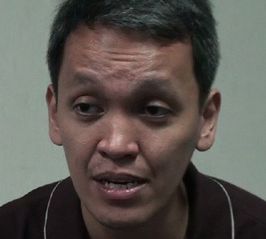MANILA, Philippines – Militant group Bagong Alyansang Makabayan (Bayan) assailed the recently passed Cybercrime Prevention Law anew and blamed President Benigno Aquino III for signing it into law.
“With its vague and overbreadth provisions that attack our constitutional rights and freedoms, it now becomes the duty of Filipinos to resolutely oppose this measure,” Bayan secretary general Renato Reyes Jr. said in a statement released Tuesday.
“While those who passed the law in Congress share responsibility for this repressive measure, the buck ultimately stops with President Aquino, who signed the law last September 12,” he said.
Protesters held a “Day of Action” against the law at the Supreme Court (SC) urging it to denounce the law. Bayan was among the several groups that have filed a petition before the SC questioning the law.
“Today we join netizens and citizens in a Day of Action against the draconian Cybercrime Prevention Law. Various sectors, from workers to students, bloggers and journalists, activists and artists, trooped to the SC today to denounce the new law and to call on the SC to give due course to the seven petitions already filed before the court,” Reyes said.
Reyes said that the law infringes on the constitution’s provisions assuring the people’s freedom of speech, of expression, and of the press. He also said that it violates the people’s rights against unreasonable searches and seizures, and right to privacy, and other fundamental freedoms.
“The law violates our right to privacy. The law allows the government to monitor and record real-time traffic data even without a court warrant and on the mere basis of ‘due cause’,” Reyes said.
“We find no comfort in the provision of the law that states that only the origin, destination, size and not content and identity will be monitored and recorded without warrant. What is to prevent the authorities from actually prying into content and identity of traffic data when the opportunity presents itself?” he added.
He also said that the personnel doing the monitoring can determine the location of any person who accessed the internet or sent text messages or emails. “This is Big Brother watching our activities on the internet,” he said.
Reyes also criticized the increased penalty for committing libel online and that it allows a person to be charged with libel twice. “The law is vague on how libel is actually committed over the internet. The law even allows a person to be charged with libel twice (one for internet and one for regular publication), based on the same article,” he said.
Reyes said that the Department of Justice would become “The Great Firewall” because it would have the power to take down website even without a court order, thus curtailing free speech.
“The DOJ becomes ‘The Great Firewall’ as it is able to restrict access to or takedown websites on the mere determination by the DOJ that the website is prima facie in violation of the cybercrime law,” Reyes said.
Conversations over mobile phones could also become a target of the government because the law covers a whole range of electronic devices, Reyes said.
“The supposed new offense of cybercrime of libel is supposedly committed by means of ‘computer systems’ which under this law includes cell phones and storage devices as well as ‘any other similar means which may be devised in the future’,” Reyes said.
“Ordinary conversations over mobile phones or the use of interactive functions of the internet (shares, comments, retweets) [could be] a target of imposition of the State’s immense powers,” he said.
Reyes called for a stronger fight against the law as it is set to take effect on October 3.
“We shall take the fight online, on the streets, in the courts and in Congress. As the law takes effect on October 3, we call for continued public vigilance and sustained actions as our best defense against this blatant assault on our rights,’ Reyes said.
“In a time when our freedoms are threatened, we should all the more aggressively exercise those freedoms,” he added.
